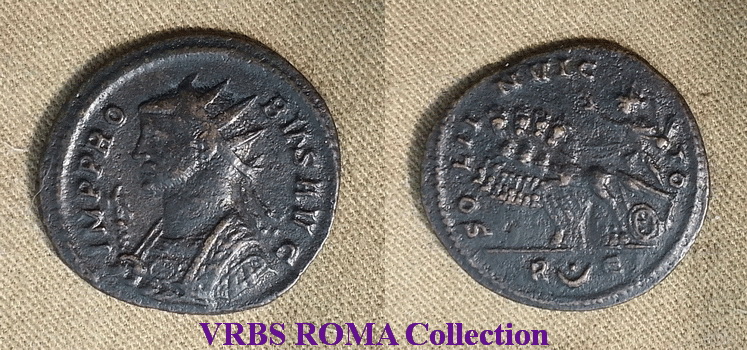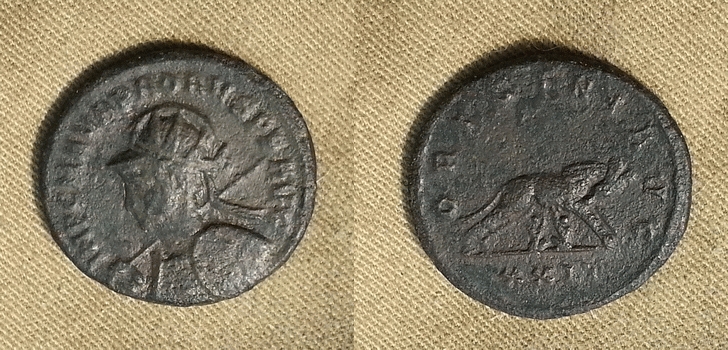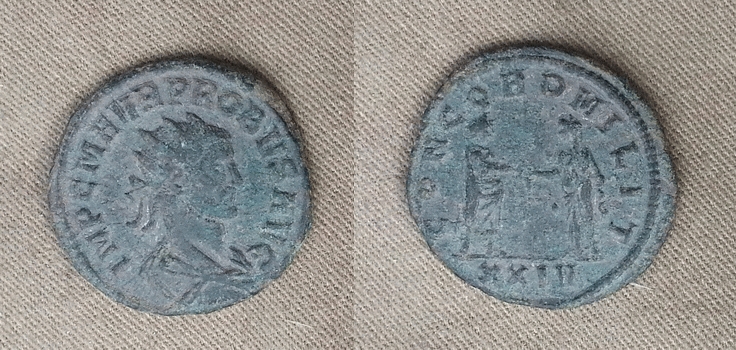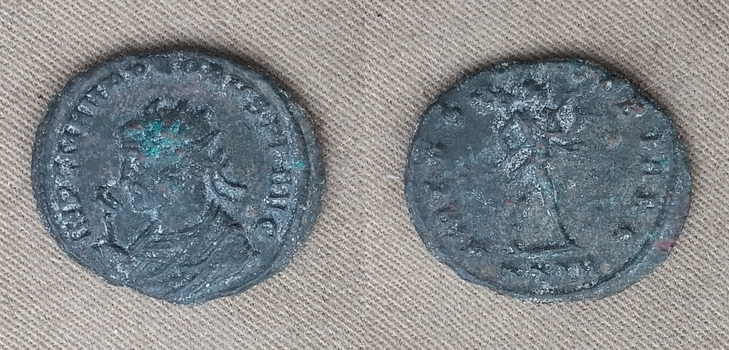
Probus, Rome, AE Antoninianus AD 278
Obverse: IMP PROBVS AVG, Radiate bust left, wearing
imperial mantle and holding eagle-tipped sceptre.
Reverse: SOLI INVICTO, Sol driving quadriga left.
Mintmark R-dot in crescent-B
Ref: RIC 202

Probus, Antoninianus
Obverse: IMP C M AVR PROBVS P F AVG, radiate,
helmeted, and cuirassed bust left holding spear and
shield
Reverse: ORIGINI AVG She-wolf right, suckling Romulus
and Remus,
XXIT in exergue
(I could not find this Obv. with twins Rev.)

Probus AE Antoninianus. Siscia Mint
Obverse: IMP C M AVR PROBVS AVG,
Radiate, draped and cuirassed bust r.
Reverse: CONCORD MILIT, Emperor standing right,
clasping hand of Concordia; XXI? in exegue

Probus, AE antoninianus, Siscia.
Obverse: IMP CM AVR PROBVS PF AVG, radiate bust left,
wearing imperial mantle and holding eagle-tipped sceptre.
Reverse: VIRTVS PROBI AVG, Mars walking right, holding
spear and trophy.
Mintmark XXIQ
RIC V-2 Siscia, 810 |
|
Probus (Latin: Marcus Aurelius Probus Augustus; c. 19 August 232 – September/October
282), was Roman Emperor from 276 to 282.
During his reign, the Rhine and Danube frontier was strengthened after
successful wars against several Germanic tribes such as the Goths, Alamanni,
Longiones, Franks, Burgundians, and Vandals. The Agri Decumates and
much of the Limes Germanicus in Germania Superior were officially abandoned
during his reign, with the Romans withdrawing to the Rhine and Danube rivers.
Early life:
Probus was born in 232 in Sirmium (modern day Sremska Mitrovica), Pannonia
Inferior, the son of Dalmatius.
Military career:
Probus entered the army around 250 upon reaching adulthood. Appointed as
a military tribune by the emperor Valerian, he later distinguished himself
under the emperors Aurelian and Tacitus. He was appointed governor
of the East by Tacitus, whose death in 276 prompted Probus' soldiers to
proclaim him emperor.
Florianus, the half-brother of Tacitus, was also proclaimed successor by
his soldiers, but he was killed after an indecisive campaign. Probus
travelled west, defeating the Goths along the lower Danube in 277, and
acquiring the title of Gothicus. His position as emperor was ratified
by the Senate around this time.
As emperor:
In 278, Probus campaigned successfully in Gaul against the Alamanni and
Longiones; both tribes had advanced through the Neckar valley and across
the Rhine into Roman territory. Meanwhile, his generals defeated
the Franks and these operations were directed to clearing Gaul of Germanic
invaders (Franks and Burgundians), allowing Probus to adopt the titles
of Gothicus Maximus and Germanicus Maximus.
One of his principles was never to allow the soldiers to be idle, and to
employ them in time of peace on useful works, such as the planting of vineyards
in Gaul, Pannonia and other districts, in order to restart the economy
in these devastated lands. Of a greater and more lasting significance,
Probus began the strategy of settling the Germanic tribes in the devastated
provinces of the empire.
In 279–280, Probus was, according to Zosimus, in Raetia, Illyricum and
Lycia, where he fought the Vandals. In the same years, Probus' generals
defeated the Blemmyes in Egypt. Probus then ordered the reconstruction
of bridges and canals along the Nile, where the production of grain for
the Empire was centered.
In 280–281, Probus put down three usurpers, Julius Saturninus, Proculus
and Bonosus. The extent of these revolts is not clear, but there
are clues that they were not just local problems (an inscription with the
name of Probus erased has been found as far as Spain). In 281, the
emperor was in Rome, where he celebrated his triumph.
Probus was eager to start his eastern campaign, delayed by the revolts
in the west. He left Rome in 282, travelling first towards Sirmium,
his birth city.
Assassination:
Different accounts of Probus's death exist. According to Joannes Zonaras,
the commander of the Praetorian Guard Marcus Aurelius Carus had been proclaimed,
more or less unwillingly, emperor by his troops.
Probus sent some troops against the new usurper, but when those troops
changed sides and supported Carus, Probus' remaining soldiers assassinated
him at Sirmium (September/October 282). According to other sources,
however, Probus was killed by disgruntled soldiers, who rebelled against
his orders to be employed for civic purposes, like draining marshes.
Carus was proclaimed emperor after Probus' death and avenged the murder
of his predecessor.
Information was taken from Wikipedia, the free encyclopedia
at this URL:
https://en.wikipedia.org/wiki/Marcus_Aurelius_Probus
|